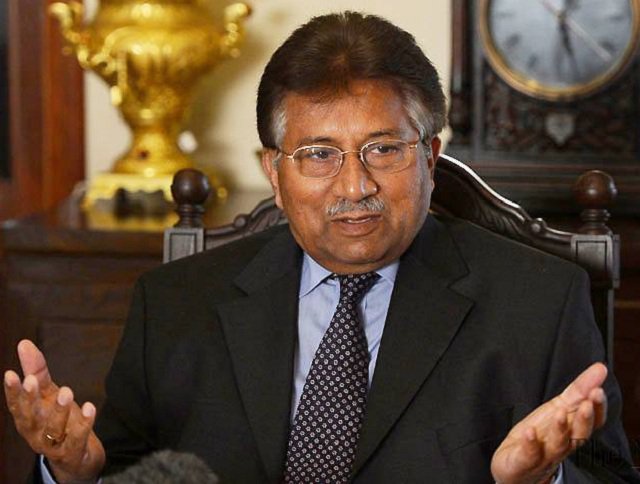
The surprise move came on a day when a Lahore High Court (LHC) bench took up a similar plea filed by Musharraf, asking his attorney to argue on the maintainability of his client’s petition on Tuesday. It is the first time in Pakistan’s history that a former army chief has faced prosecution for high treason.
The three-judge special court – headed by Justice Waqar Ahmad Seth – had reserved its verdict on November 19 while rejecting the interior ministry’s request for more time to notify a new prosecution team to wrap up the case. It had also rejected a request from Musharraf’s counsel to adjourn hearings and noted that the defence could also submit its written arguments by November 26 (today).
The court is scheduled to hand down its verdict on November 28 in the absence of Musharraf, who had flown to the UAE in May 2016 for ‘medical treatment’ and has not returned since to face the court.
According to Article 6 of the 1973 Constitution, any person who abrogates or subverts or suspends or holds in abeyance, or attempts or conspires to abrogate or subvert or suspend or hold in abeyance, the Constitution by use of force or show of force or by any other unconstitutional means shall be guilty of high treason.
And a person found guilty of high treason as defined in Article 6 of the Constitution, shall be punishable with death or imprisonment for life.
In view of the impending verdict, the government requested the IHC through the interior ministry on Monday to set aside the November 19 order of the special court and suspend its proceedings until the formation of a new prosecution team.
An IHC larger bench, led by Chief Justice Athar Minallah and comprising Justice Aamer Farooq and Justice Mohsin Akhtar Kayani, will take up the petition today (Tuesday) at 12:30 pm.
Musharraf has already petitioned the LHC to stay the special court proceedings until he recuperates and appears before the court in person. Musharraf filed the writ petition on Saturday under Article 199 and nominated the federation as respondent through the secretaries of Ministry of Interior and Ministry of Law, the FIA through its director-general and the special court through its registrar.
Meanwhile in Lahore, Justice Sayyed Mazahar Ali Akbar Naqvi of the LHC took up Musharraf’s request and directed his counsel to argue on the maintainability of his client’s petition today (Tuesday). He also asked the attorney to elaborate on how this case could be heard in Lahore when the petitioner is a resident of Islamabad.
The counsel for the former military ruler, while quoting cases against former prime minister Nawaz Sharif, argued that the LHC had found Nawaz’s petition maintainable although his cases are being heard in Islamabad.
Justice Naqvi shot down the argument saying Nawaz is a resident of Lahore while Musharraf has residence in Islamabad. Musharraf’s counsel argued that the high treason case against his client had been filed by the then prime minister without the approval of his cabinet. Later, Judge Naqvi adjourned the proceedings till Tuesday (today).
In his petition, the former president has said that due to his deteriorating health, multiple life-threatening ailments and his ageing mother, he has not been able to return to Pakistan, despite a strong desire.
He has requested the court to pass direction and declare the impugned order passed by the special court on November 19 as unconstitutional. He has also requested the court to uphold the fundamental rights of the petitioner guaranteed under the Constitution.
“In exercising its discretionary relief, the court must look at the balance of convenience, which lies heavily in favour of the petitioner, as taking away his right to a pleader of his choice, as well as his right to an audience, as a direct consequence of his infirmity, will not only seriously prejudice his case but also set a precedent for all future cases where infirm accused are at a material disadvantage to healthy ones in defending their trails,” his petition read.
He has requested the court that the respondents be directed to conduct a proper and unbiased investigation into the case, particularly with regards to the names of all alleged aiders and abettors for the proper appreciation of facts and evidence at trial. The former president contended that the application he had filed under section 265-K of CrPC may also be taken up by the special court and disposed of at the earliest.
Meanwhile, a Supreme Court lawyer, Salman Safdar, also approached the IHC in his personal capacity to stop the special court from announcing its decision in the high treason case. Safdar, who has also represented Musharraf at the special court, said the court deprived him of the right to defend his client.
“This order of the special court is against Article 4 and 10-A of the Constitution. And the special court should be stopped from unveiling its order until Gen (retd) Musharraf is given a chance to defend himself.

















COMMENTS
Comments are moderated and generally will be posted if they are on-topic and not abusive.
For more information, please see our Comments FAQ